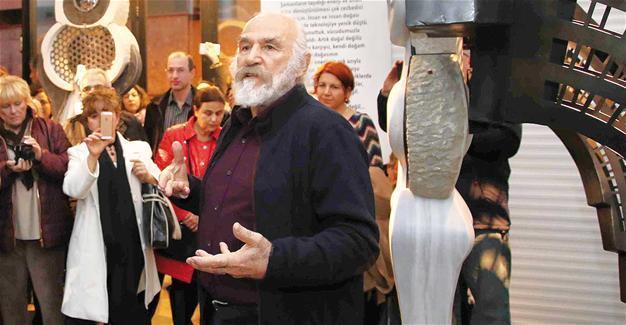Mehmet Aksoy returns with new Istanbul show
ISTANBUL

An exhibition presenting recent works by the acclaimed sculptor Mehmet Aksoy will be shown at Istanbul’s Anna Laudel Contemporary through April 20.
The exhibition, “Esoteric Illusions in the Wind of the Hammer,” marks the return of Aksoy’s unique aesthetic after five years of seclusion.
The show can be regarded as a program highlight for Anna Laudel Contemporary, which opened recently in the old finance district of the late Ottoman Empire in Karaköy, within a historic building comprising a vast exhibition space spanning five floors.
An artist at the height of his career, Aksoy is considered one of the most creative and inventive sculptors working in Turkey or elsewhere borders. His unique public realm sculpture projects are displayed in cities across Europe, with a particular prevalence in Berlin, Germany.
He is renowned also for the spiritual themes and content of his artworks, reflecting his individual sculptural imagination and metaphorical expressiveness. His works are mainly inspired by the world of shamanic rituals, spirits, mythology and nature.
His main materials are stone and metal, although describing his work he states: “We are not carving stone, we care carving light.” His works play with light, which interacts harmoniously with the sculptures to express shapes and forms.
Use of light “It’s all about arranging and making a melody out of the light upon the mass and inside the space. As sculptors, we don’t actually play with great big masses, rather we engage with light. The sculpture has light running through its veins instead of blood and that’s exactly why it can take on different meanings in relation to the angle and intensity of light,” Aksoy says of the use of light in his work.
“A dramatic or romantic expression, or a harsh, ferocious and wild expression can conversely turn through widening passages into a harmonious and soft expression. These two can multiply or blend into each other, with playful gray overtones. The initial expression can transform into a silhouette, or the mere stain of a mass that is stripped of all detail, taking on a spartan, simple and striking appearance. This is where the challenge and appeal of the art of sculpture lies. It doesn’t have the kind of fixed and unchanging light preferred by the artist perfecting the art of painting. You need to be able to deal with a different kind of light that whirls and swirls and can change at any time,” he adds.
The exhibition presents a collection of both new and recent works by Aksoy, inviting art lovers to explore the secrets of the stone and hear the wind of the hammers in the hands of the Hittite masters in Yesemek and Greek masters in Aphrodisias.
The exhibition, which is a call to participate in a journey through time into the artist’s magical world of sculpture infused by light and color, will be on display through April 20.
Mehmet AksoyBorn in 1939, Mehmet Aksoy studied at the Istanbul State Academy of Fine Arts. He won a national scholarship and studied abroad between 1970 and 1977.
Aksoy lived in London until 1972. He became one of the founding members and the president of the Berlin Turkish Academicians and Artists Association. He worked in the Sculpture Department of Berlin Art School as a “mainstershule” in 1977.
Aksoy lived and produced his artworks as a freelance artist in Berlin between 1981 and 1989.
His works are primarily made in stone but he also incorporates other material, fusing metal or different stones into a single sculpture.
In 2005, a 30 meter-long sculpture named “Statue of Humanity” was constructed on the hill across the Kars Castle. The monument depicting two human figures would have been visible from neighboring Armenia when completed. In spite of the protests, the sculpture was removed by Turkish government in 2011.
He has received many national and international awards and held numerous solo and group exhibitions. He currently continues his work on the outskirts of Istanbul in his own studio designed by him.
 An exhibition presenting recent works by the acclaimed sculptor Mehmet Aksoy will be shown at Istanbul’s Anna Laudel Contemporary through April 20.
An exhibition presenting recent works by the acclaimed sculptor Mehmet Aksoy will be shown at Istanbul’s Anna Laudel Contemporary through April 20.